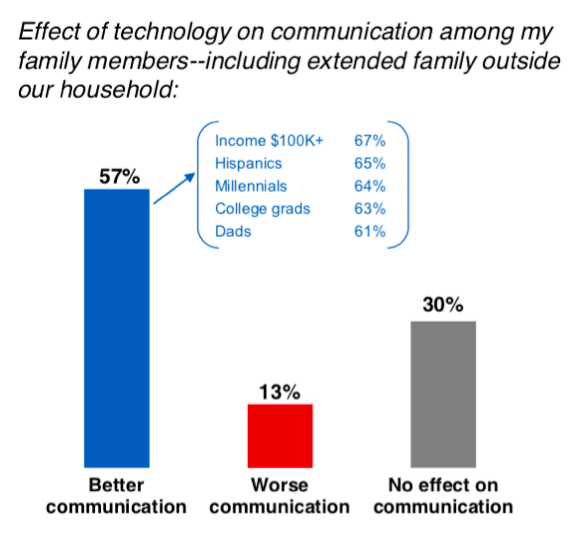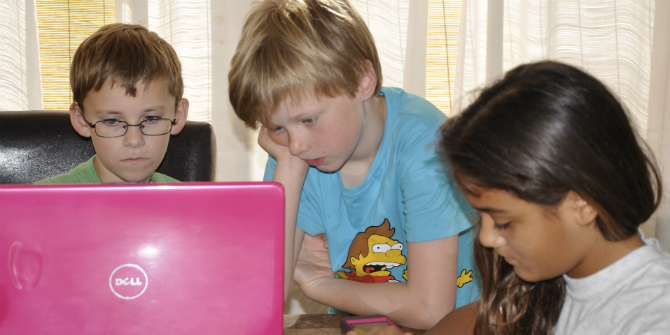 A recent study in the US has examined what parents and grandparents think about the role of technology in their lives. In this post Stephen Balkam reports that while there are still concerns over children’s media use, every generation supports each other when it comes to safety, security and honing skills online. Stephen is the founder and CEO of the Family Online Safety Institute (FOSI), an international, nonprofit organisation headquartered in Washington, DC. FOSI’s mission is to make the online world safer for kids and their families by convening top thinkers in government, industry, and the nonprofit sectors to collaborate, innovate, and to create a “culture of responsibility” in the online world.
A recent study in the US has examined what parents and grandparents think about the role of technology in their lives. In this post Stephen Balkam reports that while there are still concerns over children’s media use, every generation supports each other when it comes to safety, security and honing skills online. Stephen is the founder and CEO of the Family Online Safety Institute (FOSI), an international, nonprofit organisation headquartered in Washington, DC. FOSI’s mission is to make the online world safer for kids and their families by convening top thinkers in government, industry, and the nonprofit sectors to collaborate, innovate, and to create a “culture of responsibility” in the online world.
Last year, in a new study, FOSI explored intergenerational technology use and the ways in which parents and older people think about the benefits and challenges technology brings to their lives. In this report, parents were asked about digital role-modelling, managing content and screen time, and the resources they rely upon to help navigate their family’s online safety.
The report also looked at how older people feel about going online, to better understand their concerns, interests, and how they rely on their adult children and their grandchildren in order to cope with technology issues. What emerged from the respondents’ answers was a circular format to online safety that runs through all three generations, and an overall positive outlook on how technology aids in family communication.
Modern parents bear the greatest burden, having found themselves in a ‘sandwich generation’ where they act as a middle layer between the connected children they are raising and the elderly grandparents and relatives who also rely on them for technological support.
The report was designed to reflect the attitudes of US parents and older people. It was conducted by Hart Research Associates on behalf of FOSI, and was made possible by sponsorship from the Comcast Innovation Fund and Comcast’s Internet Essentials Program.
Where parents stand: outlook and confidence
Parents of connected children are nearly twice as likely (53%) to say that technology has made their job as a parent easier. They are also positive about the benefits technology brings to their children’s lives in areas such as life skills, creativity, academic performance and future career opportunities.
An overall outlook on technology by parents is that it brings greater connection to family life. Nearly eight in 10 parents reported that their elderly parents or relatives use technology such as text messaging, email, or social media to communicate with them. A notable percentage of those parents also said that they and older family members use those mediums and more, such as FaceTime and Skype, to stay connected with their children/grandchildren.
Importantly, the majority (57%) of parents think that technology has improved communication among their family members, as this graph below shows.
However, there are downsides as well. The clearest and most predictable exception to the perceived benefits of technology is social media use. Parents remain more negative about social media, with 52% saying that the harms of their child using it outweigh the benefits.
It is also notable that in the areas where parents report feeling positive or in control, the age of their child is a big factor. Even though 91% of parents say they set household rules for technology use, the level of confidence in their ability to track and manage what their child does online, or their view that technology helps with parenting, decreases as both the parent and the child get older.
Parents understand that their children look to them as role models for how to use technology and interact online, but cited their children’s friends as the other biggest source of influence in their lives.
The screen time debate
Amid frequent discussion by experts around the ‘compulsive’ use of technology and ongoing debates about use of ‘addiction’ as a descriptor for heavy tech use in kids and teens, this study showed a critical thinking approach by parents to questions about screen time.
As shown in the graph below, 64% of parents felt that concerns about the content their child interacted with online trumped worries about screen time only (32%). Similarly, 56% expressed the wish to have more control over the content their child consumed versus 42% who wished for more control over time limits alone. While both were regarded with importance, this may show an increase in parents’ aptitude for the fact that screen time is not always about the number of minutes a child is online, but whether that time is spent on content that is educational or creative, versus purely entertainment.
The role of older people
The report found that 80% of older people consider themselves ‘connected,’ meaning that they go online regularly, averaging 18 hours per week. The remaining 20% stated that they do not go online, and exhibited little interest in becoming connected. The attitudes of this group were an important part of the study, as their answers illustrated the ‘circular’ role of tech and online safety support within families, as the role of educator tends passed through the generations from child, to parent, to grandparents and elderly relatives.
“Regardless of their own online status, over half (53%) of older people say they have had an online safety conversation with their children, grandchildren, or younger family members.”
Older people rely on family more than any other source when seeking help on technology-related matters, particularly from their adult children. Parents confirm this; nearly all respondents with a living parent or elderly relative indicate that their parents often come to them for help understanding technology or troubleshooting problems.
In turn, nearly two in five parents say they have then had their children assist elderly relatives who need technology help.
While many older people have taken at least one step to secure their privacy and personal information, large numbers report being fearful of identity theft, financial hacking, or scams. Their reliance on family support is a matter of trust and care, rather than simply technical aptitude.
Technology has the power to bring families together. All three generations hold equal influence in different ways over the digital experience of their family when it comes to safety, security and honing skills online. These connections are why a consistent, ongoing dialogue are key to creating opportunities for family members to support each other.
This post gives the views of the authors and does not represent the position of the LSE Parenting for a Digital Future blog, nor of the London School of Economics and Political Science.








